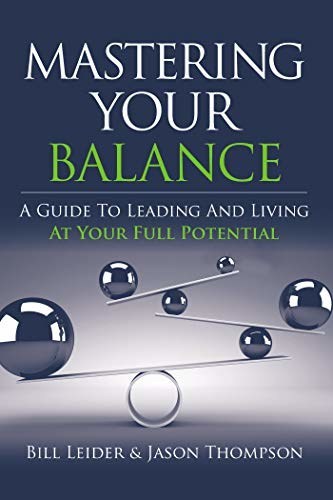MARINA DEL REY, Calif., March 26, 2021 /PRNewswire/ — Culture is the centerpiece for how, and how well things get done in every organization. The keys to a high performing culture are: a clear vision; explicitly defined values; strategic and tactical goals that are aligned with your culture; and a well-articulated greater purpose.
That’s the advice of company culture and leadership experts Bill Leider and Jason Thompson, authors of the book Mastering Your Balance: A Guide to Leading and Living at Your Full Potential (2021, Indie Books International).

“Your culture does not just exist in an internal bubble,” says Leider. “It communicates to your world. It is a place where your self-perceptions collide with the inconsistencies of how the rest of the world sees you.”
Leider and Thompson, managing partners for the consulting firm Axíes Group, are experts in teaching adaptability and resilience to business leaders. They bring a combined 60 years of executive experience along with the latest in neuroscience research to develop the elements of balance that helps leaders find and function at their company’s full potential.
According to Leider and Thompson, culture, — the what, how and why a company operates — can be open to interpretation shaped by differing personalities, agendas, behavioral norms, laws, intersectional conflicts and more.
“Explicitness and clarity are absolutely essential,” explains Leider, “as organizations become flatter and decision-making is driven further down into the operational ranks of any company.”
Here are seven areas that Leider and Thompson say warrant a leader’s attention to help create and sustain a healthy, high-performing culture:
Choose and live values that are right for you. The only values that have a chance of working are those that align with who you truly are and what you’re committed to be held measurably accountable for living.
Embrace diversity of thought. Whenever you feel yourself disagreeing with people that want to challenge, reject, or criticize—stop. Replace that urge with “tell me more” or “please elaborate.”
Make people measurably accountable for living your values. Accountability, to most people, equates to blame and punishment. Change that perception by handling it correctly. Holding people measurably accountable is about continuous performance improvement. It’s a coach correcting an athlete’s form and execution to get a better result.
Have a pervasive practice of always making and keeping commitments—as opposed to expending best efforts and merely “trying.” Commitments demand specificity. Whenever and wherever they apply, there must be mutually agreeable dates, times, and descriptions of deliverables regarding what is being committed.
Constantly ask ‘what-would-it-take’ questions whenever you encounter barriers that stand in the way of goals. Embrace and explore ambitious possibilities that break from conventional wisdom and go beyond what has been deemed “practical.”
Become transparent in the sense that your people are aware of, informed, and kept continuously in the loop. Transparency makes it easier for people to trust their leaders and their leaders’ actions. It stimulates engagement; people want to become involved when they know what’s going on. It builds loyalty in the sense that people can connect what they do with how and why it and they are relevant, and that they make a difference.
Strive to engage in win-win interactions—about everything. Override norma, zero-suml tribal instincts; replace them with inclusion and collaboration. Although win-win collaboration has been primarily used to resolve conflicts and improve outcomes in a variety of negotiating situations, it has broader applications regarding other kinds of interactions—specifically, making living your values a requirement.
Leider and Thompson point out that all of these steps require values that are both clear, explicit and for which people can be held accountable, so that there is no room for interpretation.
“And when you can also formulate and communicate a clear vision and greater purpose, clearly define needed outcomes, and trust people at all levels of the organization to self-organize and execute most effectively to achieve those goals, you will have the elements of a highly functioning culture in place.”
About Indie Books International
Indie Books International (www.indiebooksintl.com) was founded in 2014 in Oceanside, California by two best-selling business authors. Since then, the company has released more than 100 titles. Similar to indie film companies and indie music labels, the mission of Indie Books International is to serve as an independent publishing alternative to help business thought leaders create impact and influence.
Contact
Henry DeVries
306119@email4pr.com
619-540-3031
SOURCE Bill Leider and Jason Thompson

